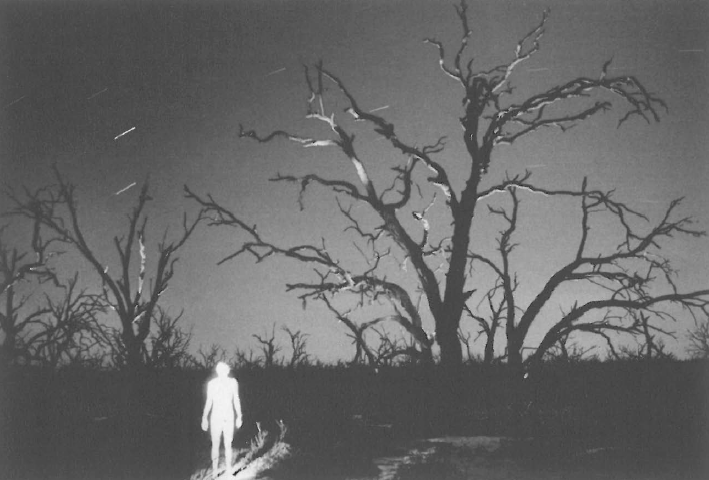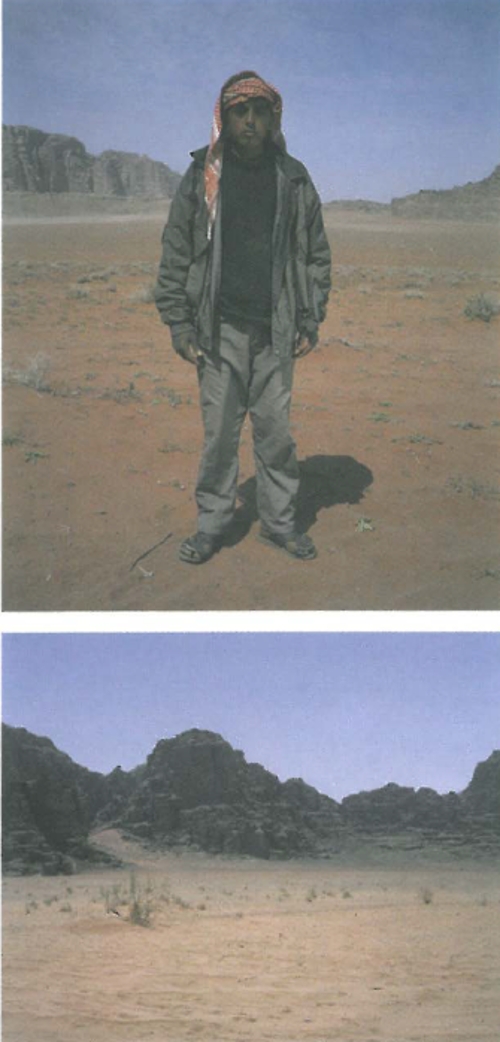
What does it mean to be an Australian? What is Australia? Like an increasing number of people in this country, photographer Trent Parke has been probing the national psyche and asking these fundamental (and difficult) questions. In 2003 he embarked on an epic road trip, looking for some answers. Parke took a long hard look at Australia, not through the rose coloured glasses of nostalgia or jingoism, but through the lens of his camera in stark black and white.
Darkness pervades Parke's exhibition Minutes to Midnight – even photographs taken during the day have a certain high contrast gloom; stark, bleak and dangerous. Images of death and brutality are scattered throughout the exhibition: a man swings a kangaroo by its tail to smash its skull, dogs savage feral pigs while their owners calmly watch, road-kill is everywhere. Parke deliberately focuses on an Australia others would rather ignore, from the gory splatter of our native animals smeared across the tarmac to the degradation of our indigenous people. In Parke's large diptych of a small town in Western Australia a hand-painted sign on the side of the pub declares 'Club Hotel Wiluna, Welcome to Paradise' (complete with sketchy palm trees) while the main street is littered with the bodies of Aboriginal Australians; falling down drunk, sprawled comatose and brawling while their children and dogs snuffle in the debris.
Of course most Australians like a drink. In her 2003 Quarterly Essay Whitefella Jump Up, Germaine Greer notes that 'Drinking is now so deeply embedded in Australian society that it is perceived as normal, healthy even.' Talk about stating the obvious, but Greer goes on to give some compelling (and controversial) reasons for our voracious liquid appetite. She argues that like all good drunks we drink to forget; we drink for its numbing relief. From the rum-soaked first fleet, to the beer swillers and chardonnay quaffers of today, white Australians drink to soothe a collective guilty conscience. Greer claims that our colonial legacy is 'a kind of emotional paralysis, a pathological indifference' to this country, and to its indigenous people, because instinctively we know that we do not belong here. Greer cites Thomas Keneally who puts it even more bluntly. He points out that by calling the heart of our country dead we admit that we feed off it like maggots. ('On Being Australian' 1984) Whether or not Parke has read Greer's essay, his photographs would make perfect illustrations.
In Midnight Self-portrait Parke's featureless form glows incandescent white against the deep black sky and stark outback landscape. This image firmly locates the white man as other, as alien, completely out of place in contested territory. In his photo Mt. Isa a huge shadowy cowboy, mythic white tamer of wild frontiers, looms over the town like a malignant spectre. And Minutes to Midnight is filled with images of Australians seeking oblivion through booze, drugs and testosterone fuelled frenzies. Parke documents anaesthetised youths lurking in the streets of hippy trippy Nimbin, piles of gleaming empty tinnies littering the streets in Birdsville, and boys laughing at the humiliation of young girls in Outback Pub. His photo of Mildura Drag Racing seems infused with the masculine menace of gladiatorial combat, while even the apparently celebratory shots of The Big Day Out seem poised to turn nasty as a woman bares her breasts to a crowd of inebriated men.
Trent Parke's intense black and white photographs present a vision of this country that is desolate, dark, and hauntingly beautiful. He went looking for Australia and found not a dead heart, but a heart of darkness. He found a harsh country still dealing with its brutal colonial past, unsure of its future and where it is going. But Parke finishes the exhibition on a cautiously hopeful note. The final image records the birth of his son. Presented on a glowing light box, the next generation arrives slippery wet, limply white and with his eyes wide open.












